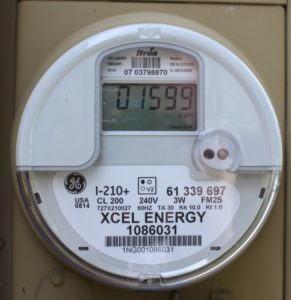Xcel Energy is promoting its Colorado Energy Plan (CEP) like a snake oil salesman selling his magical elixir. As advertised, it’s supposed to solve Colorado’s environmental problems while saving ratepayers money. But don’t think for a second the CEP won’t procure the regulated monopoly a hefty profit, so if the benefits it’s touting sound too good to be true, they probably are.
Because Xcel is a regulated utility, its year to year profit margins are determined when the Public Utilities Commission sets the company’s rate of return—usually near 10 percent. Its profits might not be as high as other corporations’, but this capping mechanism is a tradeoff for operating with little to no risk. That is, unless Xcel bypasses the capping mechanism through increasing the value of its asset base by building and owning powerplants, transmission lines, and in the near future, industrial size batteries. Not to mention, if the utility retires a power plant before its scheduled closure, it has the ability to make customers pay the remaining balance.
Simply put, if Xcel is willing, it can cheat the system and operate with no risk while procuring massive returns on its investments. And to be frank, it is willing. Just look at the utility’s proposed plan, where it wants to prematurely shut down two coal plants and move toward a portfolio made up predominantly with intermittent energy sources, solar and wind. Xcel claims the CEP will eventually save us money, but we aren’t likely to see these savings because intermittent energy sources have notoriously short lifespans.
John Balfour, President and CTO of AstroPower Corporation, admitted it’s a problem the industry faces because it inhibits solar power development. On average, wind turbines and solar panels operate 20 to 25 years. Contrast this with a coal plant’s 40 and a gas plant’s 30 years, and you see why it’s an issue. According to Balfour, under current technology, investment into wind and solar generation is short minded and would put a utility in a financially fragile position.
For utilities operating in a deregulated market, where they can’t rely on government officials guaranteeing them a return, investing in a coal or gas plant is less risky because it will operate for half a century. Just look at Comanche Units 1 and 2, the coal powered generating stations Xcel wants to close. They began commercial operation in the 1980s and are still functioning today.
![]() Xcel doesn’t face the same problems unregulated utilities face, though. Because of its regulated monopoly status, the utility understands that replacing power stations every 20 years translates into consistent, larger profit margins. And instead of making real time business decisions, Xcel simply has to convince our Public Utilities Commission its plan is both economical and beneficial for Colorado.
Xcel doesn’t face the same problems unregulated utilities face, though. Because of its regulated monopoly status, the utility understands that replacing power stations every 20 years translates into consistent, larger profit margins. And instead of making real time business decisions, Xcel simply has to convince our Public Utilities Commission its plan is both economical and beneficial for Colorado.
For example, during a recent CEP hearing, Xcel argued the plan should be adopted because it saves ratepayers money, but the savings don’t materialize until 2042 – 24 years from now.
Not only is the timing outlandish but do the math. If the generating source that is supposed to deliver these savings shuts down or must be replaced in 20 years, will we actually see them? No. When we’re supposed to receive these savings, Xcel will be opening another proceeding to replace the wind farm it’s hoping to build now.
Xcel is and always will be motivated by profit. If there is competition, this isn’t a wrong. But Xcel doesn’t have competition. It’s a regulated monopoly, operating in a low risk market that enables it to gouge customers for what it claims is economical and beneficial.
The Colorado Energy Plan won’t save ratepayers money and it won’t save the environment. And Xcel isn’t a savior on a white horse. The monopoly is a twenty-first century century snake oil salesman, hawking a magical elixir, solar and wind energy. The only difference, we can’t expect him to leave town after the show.
Brit Naas is an energy policy researcher at the Independence Institute, a free market think tank in Denver.


